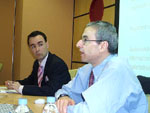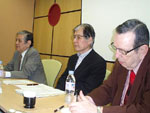China As a Long-term Global Risk Factor: Experts Agree
Takahiro MIYAO (Professor and Head, Japanese Institute of Global Communications, IUJ)
| China As a Long-term Global Risk Factor: Experts Agree
|
| Date/Time: | April 24 (Th) 12:30-14:00 & April 25 (F) 16:00-18:00 |
| Place: | GLOCOM Hall, 4-15-21 Roppongi, Minato-ku, Tokyo |
| Program: |
Day 1:
"China As an Opportunity and Challenge to the US & Japan"
Panelists:
Mr. Robert Dujarric (Temple University Japan)
Mr. Rene Duignan (Central Bank of Italy)
Day 2:
"The China Problem in the Olympic Year"
Panelists:
Prof. Seiichiro Takagi (Aoyama Gakuin University)
Prof. Toshihiko Kinoshita (Waseda University)
Mr. Sam Jameson (Freelance Journalist)
Moderator
Prof. Takahiro Miyao (International University of Japan)
|
| Co-Sponsors: | IUJ Global Communications Platform and Temple University Japan |
There was a two-day symposium held at GLOCOM Hall in Roppongi on April 24-25, co-sponsored by the IUJ Global Communications Platform and Temple University Japan Campus. The following is a brief summary of the symposium.
Day 1: China As an Opportunity and Challenge to the US and Japan
 On Day 1, there were two speakers, Mr. Robert Dujarric (Temple University) on political and security issues, and Dr. Rene Duignan (Central Bank of Italy) on economic issues. It was interesting to find out that although the two speakers examined different aspects of China from each other, their arguments and conclusions turned out to be quite similar, or essentially the same in the following sense. On Day 1, there were two speakers, Mr. Robert Dujarric (Temple University) on political and security issues, and Dr. Rene Duignan (Central Bank of Italy) on economic issues. It was interesting to find out that although the two speakers examined different aspects of China from each other, their arguments and conclusions turned out to be quite similar, or essentially the same in the following sense.
First of all, China appears to be posing a lot of problems and serious threats to other countries including the US, Japan and the EU. However, there is not much we can do about it but try to integrate China into the international community as a "responsible stakeholder," who should act accordingly for the benefit of its own as well as others at the same time. While we need to try our best in this regard, we must not forget that future prospects for China are hard to predict and full of risks in the global scale.
Day 2: The China Problem in the Olympic Year
 On Day 2, three speakers, Prof. Seiichiro Takagi (Aoyama Gakuin University), Prof. Toshihiko Kinoshita (Waseda University) and Mr. Sam Jameson (Freelance Journalist) made brief presentations on various issues concerning China in relation to Japan. On Day 2, three speakers, Prof. Seiichiro Takagi (Aoyama Gakuin University), Prof. Toshihiko Kinoshita (Waseda University) and Mr. Sam Jameson (Freelance Journalist) made brief presentations on various issues concerning China in relation to Japan.
In particular, Prof. Takagi, political scientist, focused on the upcoming visit of Chinese President Hu Jintao to Japan and a joint statement about Japan-China relations based on "common strategic interests" for the both countries, where such difficult problems as the East China Sea issue will not be discussed. Prof. Kinoshita, economist, explained China’s short-term economic problems such as inflation, asset bubble, and possible recession after the Olympics, and also longer-term issues such as the structural adjustment of China’s development pattern, particularly concerning export orientation, capital liberalization, agricultural problems and environmental issues, where the longer-term issues seem to involve more serious risks and uncertainties. Mr. Jameson, freelance journalist, presented his personal observations on the Tokyo Olympics, when Japan tried to show the accomplishment of its postwar reconstruction and express its gratitude for assistance and support of the international community to the outside world, whereas the Beijing Olympics apparently tries to show off the "rising power" of China as much as possible, which seems to backfire, due to the Tibet issue.
After the presentations, a lively discussion took place and most of the questions centered around the question of how to integrate such a huge and nationalistic country as China into the international community as a "responsible" stakeholder, as raised and left unanswered on Day 1. In the end, everyone agreed that we should try our best to communicate with the general public in China and inform them of objective facts about Japan and the world at large.
It was quite an interesting and stimulating symposium, although more analyses and discussions as well as policy initiatives are needed to help resolve various issues concerning Japan-China relations.
This report is adopted from the following blog (with its Japanese translation):
Day 1: http://glocom.blog59.fc2.com/blog-date-20080424.html
Day 2: http://glocom.blog59.fc2.com/blog-date-20080425.html
|





